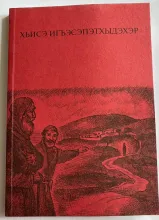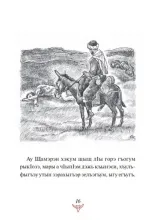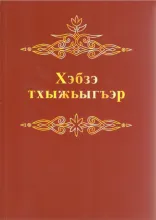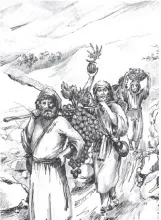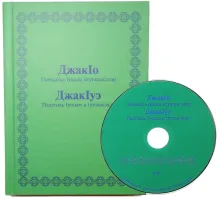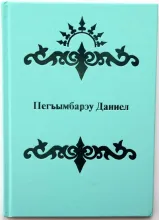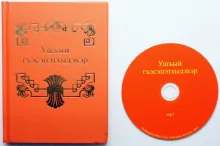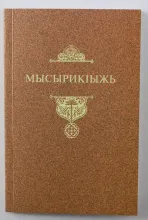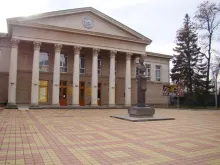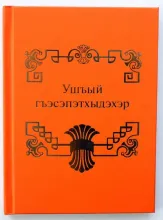Adyghe
news-04052021
IBT’s Bible translation project in the Adyghe language continues its work with the recent publication of Gospel Parables. This edition had been previously published by IBT in many other languages of Russia, such as Agul, Bezhta, Dargi, Digor, Dungan, Even, Kabardian, Kumyk, Lak, Nenets, Nogai, Rutul, Siberian Tatar, Tatar, and Tsakhur.
Besides the collection of parables from Luke’s Gospel that IBT has used in previous editions -- the Good Samaritan (Lk 10:30-35), the Rich Fool (Lk 12:16-21), the Pharisee and the Tax Collector (Lk 18:10-14), the Rich Man and Lazarus (Lk 16:19-31), the Lost Sheep (Lk 15:3-7) and the Prodigal Son (Lk 15:11-32) -- the Adyghe publication also includes several additional parables from Luke and Matthew: the Persistent Widow (Lk 18:2-8), the Sower and the Seed (Mt 13: 3-8, 18-23), the Unmerciful Servant (Mt 18:23-35), the Workers in the Vineyard (Mt 20:1-16), and the Talents (Mt 25:14-30).
news-17112020
Adyghe belongs to the Abkhaz-Adyghe language family of Caucasian languages. There are 117,500 speakers, most of whom live in the Republic of Adyghea in southern Russia.
In preparation for the future publication of the Pentateuch in Adyghe, the book of Deuteronomy was recently released in advance in electronic form, and now it is also in printed form. The first two books of the Pentateuch were printed 2005 (Genesis) and 2015 (Exodus), while Leviticus and Numbers are still in the translation process.
news-111120
IBT is happy to announce the release of a bilingual edition of Ecclesiastes in Adyghe and Kabardian, closely-related languages of the North Caucasus in the Russian Federation.
First, a little history. The official classification of Adyghe and Kabardian as separate languages appeared in 1922, when the Adyghe (Cherkess) and Karachay-Cherkess autonomous regions were formed inside the USSR. Until that time, the two languages were considered to be dialects of a single Circassian language. Over the past century, Adyghe and Kabardian have each developed independently (especially in their written forms), but some speakers of Adyghe and Kabardian still feel that they belong to the same language community. The Ecclesiastes publication was born out of a desire to preserve and develop the community between these two peoples.
newsletter-300519
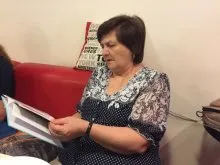
news-050517
There are about 120,000 speakers of the Adyghe language, most of whom live in the Republic of Adyghea in the northwest Caucasus region of the Russian Federation.
From 2002 to 2015 IBT published 11 Old Testament books in Adyghe: 1-2 Samuel (2002), Genesis (2005), Ruth, Esther and Jonah (2006), Psalms (2007), 1-2 Kings (2009), Exodus (2014), and Proverbs (2014, 2016). The New Testament was published in the early 1990s. Now the book of Daniel has also been published.
news-160216
IBT has published the second print-run of the book of Proverbs in the Adyghe language (northwest Caucasus, approx. 117,000 speakers). The first print-run of 2014 was very popular and was distributed among Adyghes almost immediately.
news-11.03.15
IBT is continuing to make progress towards the goal of translating and publishing the Old Testament in the Adyghe language, spoken by about 120,000 people in the Northwest Caucasus in south Russia and many more in the diaspora. The latest trial publication is the book of Exodus, delivered to Adyghea in late February.
news-01.12.14
In late November 2014, IBT's audio manager Rodion Popov traveled to Maikop, the capital city of Adyghea in south Russia, to record the recently published book of Proverbs in the Adyghe language. Three professional actors from the Adyghe National Theater lent their voices to produce the recording.
news-04.07.14
IBT has added the Adyghe translation of the Old Testament book of Proverbs to our long list of publications. The Adyghe language is spoken in the northwestern part of the Caucasus area of Russia by about 117,000 people, who are closely related to the Kabardian and Cherkess peoples and together with them make up the Circassian ethnic group.

